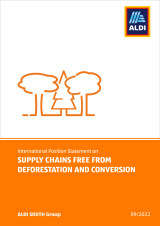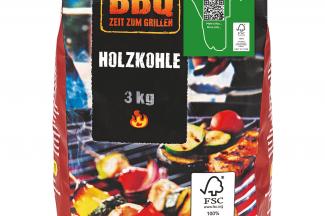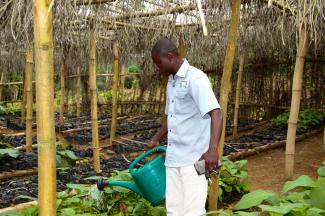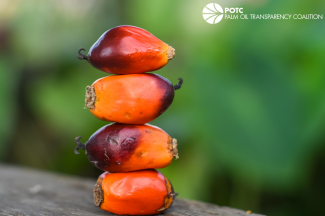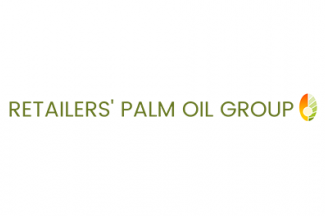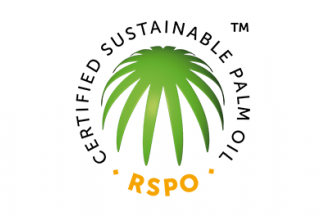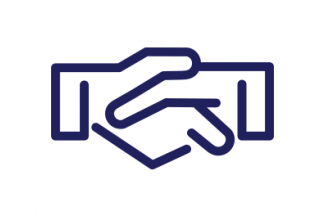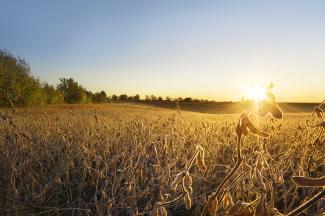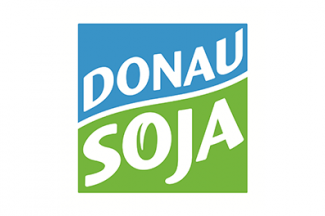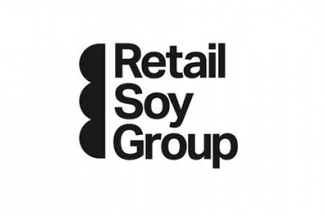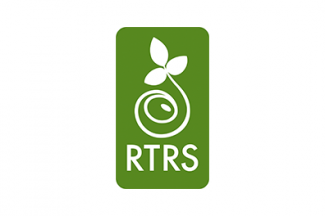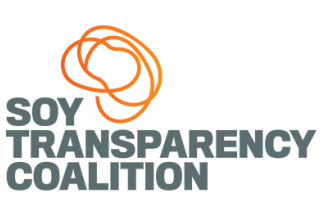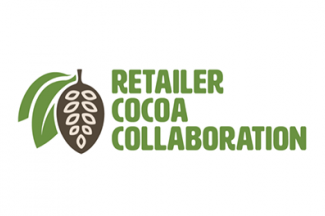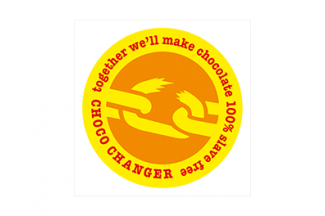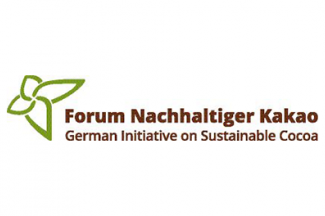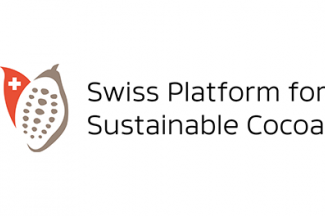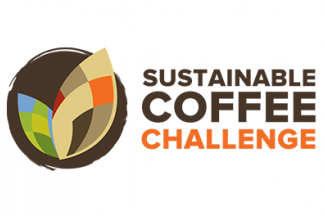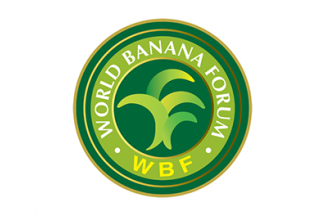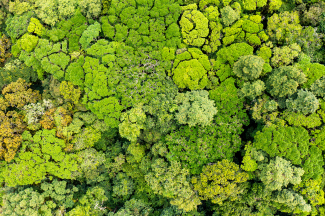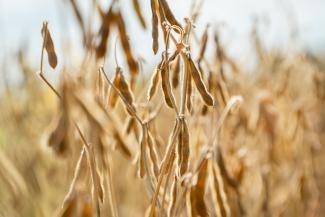
Forest Protection
Our Approach
As a global retailer, one of the ALDI SOUTH Group’s key responsibilities is to ensure that our products do not contribute to the destruction of forests. Forests are diverse and complex ecosystems that provide a habitat for plants, animals, and people. For local communities, they provide the resources for their livelihoods, food, and medicine. This is particularly true for tropical forests, which are home to 50% of the total plant and animal biodiversity on the planet’s land and contain significant amounts of the planet’s freshwater resources.
Protecting the world's forests is also essential for climate change mitigation. The challenge is that deforestation continues at alarming rates. Conversion and degradation of natural forests and other natural ecosystems to create agricultural land is a key driver of global habitat loss and contributes to 15% of global CO2 emissions.
Our commitment
The ALDI SOUTH Group is committed to eliminate deforestation and conversion of natural ecosystems from our high-priority supply chains by 31 December 2025.
An assessment was conducted in 2020, which identified the supply chains with the highest deforestation-risk. We have defined commodity specific milestones leading up to 2030 for our high priorities and we are planning to regularly update the risk assessment and annually report on our progress.
Our approach to eliminate deforestation and conversion from our supply chains is built on three pillars: Standards, Transparency, and Collaboration.
As the latest accepted cut-off date for any commodity, we specify the 1st January 2020. For most commodities, earlier cut-off dates are implemented, including via sustainability certification.
Our “International Position Statement on Supply Chains free from Deforestation and Conversion” and this page explain how we aim to eliminate deforestation and conversion from our supply chains.
Our Actions
Risk assessment
Our 2020 Deforestation-risk Assessment examined more than 25 commodities based on their global deforestation-risk and relevance in our supply chains. The aim of this assessment was to identify adverse impacts the ALDI SOUTH Group may have on forests, gain insights into our actual impacts and understand our greatest levers to minimise risks. The assessment allowed us to identify the ten highest deforestation-risk supply chains within our business.
Standards
Independent third-party certification schemes are key in allowing retailers to determine if sustainability requirements are implemented on the ground. This is especially important when local environmental protection legislation and/or law enforcement in sourcing countries are insufficient to guarantee the protection of forests and natural ecosystems.
Transparency
Mapping the supply chain of raw materials is necessary to ensure we have sufficient transparency to verify compliance with our requirements, analyse risks, and implement projects with a direct impact in and beyond our supply chains. For some of the commodities that have the highest impact on deforestation, such as palm oil and soy, supply chains are especially complex, and a relatively small number of raw material traders have a much higher leverage than retailers or manufacturers. Regular assessments of raw material supply chains performed individually or collectively, will assist us in achieving transparency at trader level in the upcoming years.

Collaboration
For complex supply chains, collaboration between stakeholders is essential for market transition and alignment between different actors in the supply chain.
We collaborate with:
- Standard bodies to strengthen certification criteria.
- Our direct suppliers and traders to ensure implementation of our requirements in our own supply chains.
- Industry groups across the sector, including the Palm Oil Transparency Coalition (POTC), the Consumer Goods Forum (CGF), and the Retail Soy Group (RSG).
Capacity building
We engage in the origin of raw materials of our products to create direct impact, promote sustainable production, and support local farmers. We consider collaboration with partners on the ground to support projects or [landscape approaches], which have the most impact and minimise deforestation and conversion.
Support of legislative frameworks
We want to go one step further to successfully address systematic challenges throughout complex supply chains. Our longstanding commitment and cooperation with various stakeholders has shown that the best way to minimise deforestation within complex supply chains is through joint initiatives and partnerships. The urgency to create maximum leverage in a timely manner requires all relevant political, economic and social stakeholders to collaborate. Legislative action against deforestation is essential to create a level playing field and to drive sector-wide change. It can contribute significantly to the prevention of deforestation and mitigate climate change and protect the planet’s biodiversity.
ALDI supports the introduction of a robust legislative framework in the countries where we operate, such as the EU Commission’s initiative to halt import-driven deforestation and to regulate deforestation-free products.
High priorities

Palm (kernel) Oil
To prevent deforestation, the palm (kernel) oil used in our own-brand products is certified according to the Roundtable on Sustainable Palm Oil (RSPO) chain of custody standard. The share of certified palm (kernel) oil sourced by the ALDI SOUTH Group has increased significantly: from 69% in 2016 to 100% since 2018.
Beyond Certification, the ALDI SOUTH Group is working on transparency and smallholder inclusion in the palm oil sector: We are a founding member of the Palm Oil Transparency Coalition (POTC) and are member of the Retailers' Palm Oil Group (RPOG). In 2016, we developed an approach to better integrate smallholders in our value chain: In addition to being a member of the Roundtable on Sustainable Palm Oil (RSPO) Smallholder Standing Committee and purchasing Independent Smallholder Credits, we also supported smallholder farmers on the ground through our smallholder project in Cote d’Ivoire together with ALDI Nord and our partner Solidaridad.
Soy
Soy is one of the major drivers of global deforestation, especially in South America. The largest share of global soy production is being used as animal feed and therefore transparency and traceability are a challenge due to the complexity of the supply chain. Our aim is to ensure that the cultivation of soy in our supply chains does not harm natural ecosystems, such as forests, or violates human rights.
We collaborate with other retailers as part of the Retail Soy Group (RSG) and Soy Transparency Coalition (STC) in order to tackle these challenges, and to increase the availability of sustainable soy feed.
We aim to use >90% of soy certified to a deforestation-free standard or from deforestation-free origins in our direct soy and animal feed supply chains by the end of 2025. This means European and US soy is preferred in the respective market.
Soy Footprint
We have calculated our soy footprint from 2017 onwards, which provides a quantitative impact assessment of our supply chains. Since 2018, we have participated in the Collective Soy Reporting (CSR) with a group of European retailers. The CSR quantifies and maps the use of soy on individual company level and analyses the results in a sector-wide manner. According to the CSR, 44% of the 2020-soy footprint of ALDI SOUTH Germany, HOFER S/E and ALDI UK/Ireland was either certified according to an accepted deforestation-free standard or from deforestation-free origins.
Beyond using the insights to move towards a deforestation-free soy supply chain, the CSR results are summarised in the Soy Report, identifying recommendations for the whole sector to move towards deforestation-free soy meal.
Timber & Paper Products
We focus on sourcing all timber used for our own-brand products in a sustainable manner. We have set the goal to use only certified materials according to the FSC, PEFC, Sustainable Forestry Initiative (SFI; only for the US market), Blue Angel standard, or made from recycled materials by the end of 2021. According to our data for 2020, 84% of our relevant own-brand products were certified or recycled.
From 2019-2020, ALDI SOUTH Germany and HOFER S/E worked with the Forest Stewardship Council (FSC) in Namibia. The aim of the project was to increase the amount of sustainable and directly traded charcoal on the market, which benefits local farmers directly. After the successfully conclusion of trainings and audits, the farmers are certified according to the FSC Forest Management Standard.
Beef
Beef is one of the main drivers of deforestation, especially in South America. Brazilian beef supply chains are especially complex and hard to monitor: meatpackers and slaughterhouses are only allowed to purchase cattle from legally registered farms in the Amazon region, but different steps of the cattle supply chain are often carried out on different farms. The farms for calving, rearing, and fattening often stay hidden and only the last step, the legally registered farm, can be verified. As a result, so called cattle laundering from farms, which recently cleared rainforest for pastures, to legally registered farms, is a major challenge.
According to our deforestation-risk assessment 2020, less than 1% of ALDIs global beef supply is from deforestation-risk regions in South America, such as Brazil and Argentina. In contrast to most other high-priority supply chains, there is no third-party verified certification scheme for beef that excludes deforestation. We have developed an international framework to further reduce the deforestation-risk within our beef supply chains with a focus on promoting more regional beef in our national markets.
Our leverage to drive more sustainable local production in South America is limited due to the low volumes we purchase from there. Therefore, we focus on beef from lower risk regions, such as Uruguay, and withdrawing from risk countries, only where there are no assurance mechanisms in place.
Cocoa
Cocoa is grown by smallholder farmers who may face difficult working and living conditions. The cocoa used in our products comes mainly from Côte d’Ivoire and Ghana. Human rights violations including child labour, as well as environmental risks such as deforestation, are key challenges when sourcing cocoa.
To tackle these challenges, we require the sustainability standards Rainforest Alliance, Fairtrade, Fairtrade USA or Organic (in combination with one of the former standards) when buying products containing cocoa. We have already converted the cocoa used in our own-branded products: 100% of our relevant cocoa products are from certified sources since 2021.
The ALDI SOUTH Group additionally engages with certification organisations to strengthen requirements and improve sustainability standards at farm level.
Beyond certification, the ALDI SOUTH Group is part of the Retailer Cocoa Collaboration (RCC), which commits to support the Cocoa and Forests Initiative. This initiative will drive change by protecting and restoring forests in Côte d’Ivoire, Ghana and Colombia.
Coffee
Coffee is among the world’s most-traded raw materials and is primarily cultivated by smallholder farmers in sub-tropical regions. There are human rights and environmental challenges, including the risk of deforestation, when sourcing coffee. The ALDI SOUTH Group is committed to changing this by fostering fair working conditions and environmentally friendly production in the cultivation of coffee.
By sourcing from suppliers using the sustainability standards Fairtrade, Fairtrade USA, Rainforest Alliance and Organic, we can reassure our customers that we are supporting coffee growing communities, protecting biodiversity, and preventing deforestation.
We aim to source >75% of certified coffee products by a deforestation-free standard by the end of 2025 and to increase traceability to the country-of-origin level.
Banana
Human rights violations and environmental risks such as living wages and incomes, as well as water scarcity and risk of deforestation are key challenges when sourcing tropical fruit.
In order to tackle these challenges, 100% of bananas are either from lower risk origins or certified to a standard that protects forests and human rights, specifically Rainforest Alliance or Organic in combination with either Fairtrade certification or the GLOBALG.A.P. Risk Assessment on Social Practice (GRASP), since 2020.
Wood-Based Packaging
Product packaging plays an important role in protecting our products from damage, ensure quality of our products and avoid food waste.
The 2020 Deforestation-risk Assessment identified wood-based packaging as one of the supply chains with the largest amounts of raw material used for the ALDI SOUTH Group. However, more than 95% of the raw material originates from regions with no high deforestation risk.
All primary wood- and paper-based packaging must be either FSC, PEFC or SFI (relevant for the US market) certified or made from recycled material (>70% recycled content). These measures reduce the deforestation-risk significantly.
Coconut
In the 2020 Deforestation-risk Assessment, ALDI SOUTH Group’s own-branded coconut products were identified to have a high deforestation-risk profile. Since this assessment, we have started developing a framework together with internal and external stakeholders in order to address deforestation risks within our coconut supply chains.
Sugar cane
Sugar cane is used in the production of a wide variety of products, from cookies and chocolates to dairy products and drinks and was identified as one of the supply chains with the highest deforestation-risks for ALDI. The share and origins of sugar cane used in our products varies a lot between the different countries we operate in. We have started developing a framework together with internal and external stakeholders in order to address deforestation risks within our sugar cane supply chains.
Our CR Performance
Palm (Kernel) Oil
Our Goal: All palm (kernel) oil and palm (kernel) oil-based derivatives and fractions used in our own-brand products are certified.
Soy
We regularly calculate our soy footprint with the aim of minimising deforestation risks and negative impacts in our supply chains. In 2020, we calculated the soy footprint for the entire ALDI SOUTH Group. The results show that most of the soy in our supply chains is associated with a low risk of deforestation.
Packaging
Our Goals:
- By 2025, 100% of our own-brand packaging will be reusable, recyclable or compostable.
- By 2025, we will reduce our own-brand packaging material in relation to sales by 15% (baseline 2020).
- By 2025, we will have 30% recycled content in our own-brand plastic packaging.
- By 2025, we will reduce the amount of virgin plastic in our own-brand packaging in relation to sales by 40% (baseline 2020).
Timber
Our Goals:
- All relevant wood-based products are produced from recycled or certified raw materials.
- All wood and paper-based components contained in the product packaging of our ALDI own-brand core range food and non-food products are produced from certified raw materials or recycled materials.
Cocoa
Our Goal: All cocoa used in relevant own-brand products is from certified sources.
Coffee
Our Goal: The percentage of sustainable coffee products is to be steadily increased.
Banana
Since 2019, all European and US stores exclusively offer bananas that are certified according to the Fairtrade or Rainforest Alliance standard or organic bananas in combination with either Fairtrade certification or the GLOBALG.A.P. Risk Assessment on Social Practice.
Our Projects, Memberships & Working groups
News
Library
Sustainable Development Goals
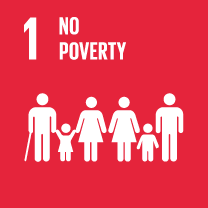
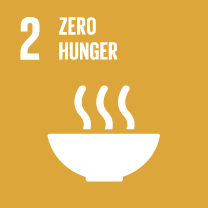
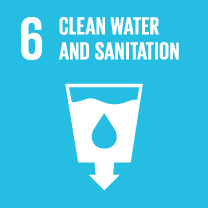
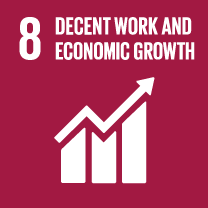
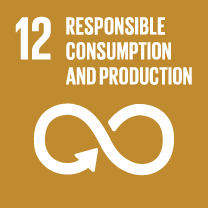
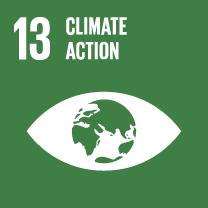
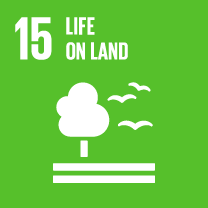
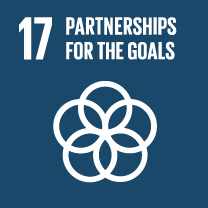
UNGC
Human Rights
Principle 1
Support and respect the protection of human rights
Principle 2
Not complicit in human rights abuses
Labour
Principle 3
Uphold freedom of association and recognition of right to collective bargaining
Principle 4
Elimination of forced and compulsory labour
Principle 5
Abolition of child labour
Principle 6
Elimination of discrimination in respect of employment and occupation
Environment
Principle 7
Precautionary approach to environmental challenges
Principle 8
Promote environmental responsibility
Principle 9
Development and diffusion of environmentally friendly technologies
